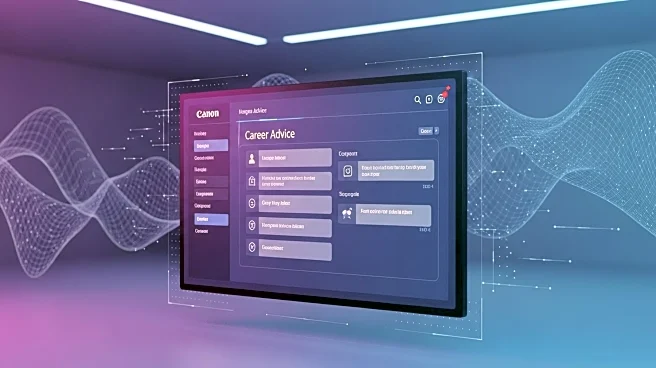What's Happening?
AI chatbots, such as ChatGPT, are increasingly being used by individuals seeking career advice. These tools have become popular for their ability to provide guidance on career mapping, skill development, and strategic planning. Users like Priscilla Abii and Jeanie Thompson have turned to AI to explore career options and set long-term goals. According to an analysis by Anthropic, nearly 20% of career-focused conversations with AI involve creating personalized career maps. However, while AI offers a wealth of information, it lacks the personal touch and emotional support that human mentors provide. Experts like Ruth Gotian emphasize that AI's guidance is often generic and cannot replace the nuanced insights and emotional backing of human mentors.
Why It's Important?
The rise of AI in career counseling highlights a shift in how individuals approach professional development. AI's ability to process vast amounts of data can help users identify career paths and necessary skills, potentially democratizing access to career advice. However, this trend also raises concerns about the diminishing role of human interaction in professional growth. The lack of emotional support and personalized feedback from AI could lead to a reliance on technology that overlooks the importance of human mentorship. This shift could impact workplace dynamics, as younger professionals may miss out on valuable interpersonal skills and networking opportunities traditionally gained through human mentorship.
What's Next?
As AI technology continues to evolve, it is expected to provide more refined and accurate career advice. However, the challenge remains to balance AI's efficiency with the need for human connection. Companies and educational institutions may need to integrate AI tools with traditional mentorship programs to ensure comprehensive career development. Additionally, there may be a push for AI platforms to incorporate more personalized and empathetic features to better support users' emotional and professional needs.
Beyond the Headlines
The increasing reliance on AI for career advice could have broader implications for workplace culture and employee development. As AI becomes more integrated into career planning, there may be ethical considerations regarding data privacy and the potential for algorithmic bias. Furthermore, the shift towards AI-driven advice could influence how organizations structure their training and mentorship programs, potentially leading to a reevaluation of the role of human interaction in professional growth.









